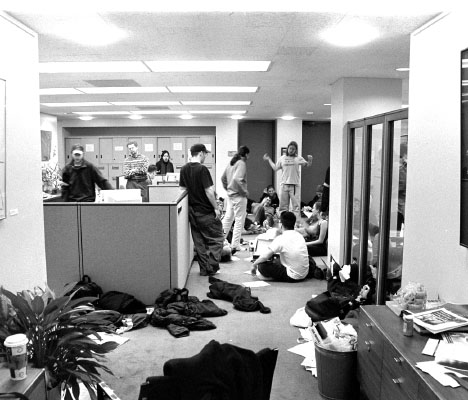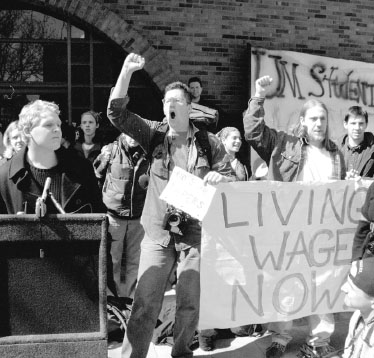The University Record, March 22, 1999
Editor’s Note: View the University’s anti-sweatshop/human rights policy.
By Julie Peterson
News and Information Services

The University last Thursday (March 18) released a code of conduct to which it will hold all vendors who are licensed to sell apparel and other merchandise with the U-M name and logos.
The code will apply to all new licensing contracts as well as those up for renewal. The University also will ask all current licensees to adopt the code’s provisions “expeditiously.”
“We believe firmly that workers in this country and abroad who help produce licensed goods bearing the insignia or name of the University of Michigan should be treated humanely and fairly and should work under healthy and safe conditions,” the code states.
President Lee C. Bollinger said the far-reaching, comprehensive code will serve as “a national model for ensuring ethical business practices, particularly in our provision for full disclosure of the location of manufacturing facilities. Disclosure of locations will enable monitoring of the facilities to ensure compliance with the code.”
“We believe that workers should receive wages that at least meet their basic needs and respect their basic human rights,” Bollinger said. “Human rights is a concept that we highly value as an institution.”
The code’s provisions include ensuring compensation standards, humane limitations on required work hours, limitations on child labor, and a safe and healthy work environment.

The code has grown out of the University’s participation over the past year in a national, intercollegiate task force charged with creating an anti-sweatshop code. University officials also have been working with the Student Organization for Labor Equity (SOLE), to address the group’s concerns about the use of sweatshop labor to produce apparel bearing U-M logos.
The students staged a sit-in in Bollinger’s office beginning March 17. The University has no plans to remove the students, officials said.
Marvin Krislov, vice president and general counsel, who has been meeting with the students, say they deserve credit for raising the level of public awareness on this issue.
“We agree with the students on virtually all points of the code, except the ability to commit to a particular ‘living wage standard’ at this time. We cannot commit to a standard that has not yet been defined. It is very important that we have a policy that we can abide by and enforce,” Krislov said.
“The students and the University are working toward the same objective, and we have agreed to study this issue carefully with the goal of ensuring that workers will receive wages that will meet at least basic human needs.”
Provisions of the code include appointment of a joint faculty-student-staff anti-sweatshop advisory committee, full public disclosure of the location of manufacturing facilities and protection of women’s rights. The code also provides for joint research with other universities and with government entities “to determine if guidelines can be established and to suggest such guidelines that would create compensation standards.” The U-M code complements and goes beyond recommendations of the national task force to the Collegiate Licensing Co. CLC is the licensing agent for the logos of more than 160 colleges, including the U-M. Among the schools that publicly report royalty sales, the U-M is the number one seller of licensed goods in the country. Royalty revenues were $5.7 million in 1997-98, the year that the U-M won national championships in football and hockey.
Editor’s Note: The following statement on the University’s anti-sweatshop/human rights policy was issued March 18 by President Lee C. Bollinger at the start of the Board of Regents meeting.
“Today we are announcing a comprehensive policy designed to ensure that apparel and merchandise bearing the University mark or other insignia are manufactured in accordance with ethical and legal business practices. We at this University are a leader in the marketing of university apparel, and we want to help lead in guaranteeing that the workers who make those goods receive their human rights and basic human dignity.
“We are proud of this policy. It will help ensure fundamental freedoms for these workers, including decent and safe working conditions, and protection from coercive, exploitative conditions. To ensure that these principles are followed, we are committing to full public disclosure of the manufacturing locations of our licensees. We are also committed to studying carefully the issue of compensation standards. We will join other educational institutions and national and international organizations to try to determine guidelines for wages that will meet at least basic needs, consistent with human rights and human dignity.
“Let me say a word about our students who have helped lead the call for this policy. I have met with them on two occasions, and I know they have met with others on numerous occasions, especially with Marvin [Krislov, vice president and general counsel]. Many of the students have been residing in my office for the past two days. We can be enormously proud of these students for the work that they have done on this issue and for their efforts to try to help us understand how to think about these important questions of human rights. They remind all of us how important it is to consider our impact on others in the greater communities we touch.
“We have been able to agree with the students on virtually every point. We have not been able to agree on the extent to which we can commit ourselves to standards not yet defined. We must be responsible about the commitments we make. We share the students’ objectives and look forward to working with them to implement these principles. There is plenty of work to do. A piece of paper alone, after all, does not achieve the results we all want. Let me reassure the students that we will continue to respect their rights to speak, and that we do not plan to prosecute or penalize them in connection with their exercise of free speech.”
Students end sit-in
Members of the Student Organization for Labor Equity (SOLE) ended their 51-hour occupation of President Lee C. Bollinger’s office at noon on March 19 with a press conference in front of the Fleming Building.
The “No Sweat 30” exited the building to cheers of about 75 supporters, indicating that the University had come forth with the strongest code of conduct of any school, but “only because of the continued commitment of students,” said SOLE member Saladin Ahmed.
He cited as “victories” the inclusion of provisions related to women’s rights, full disclosure of the locations of manufacturing facilities, appointment of an advisory committee, and a wage that will meet basic needs.
Noting that the administration “won’t accept a timeline on wages,” Ahmed said that the code of conduct released by the University March 18 “is not a final agreement. We accept this only as a down payment.”
An additional continuing sticking point is whether the University will sign the Apparel Industry Partnership and Fair Labor Association (AIP/FLA) code, which SOLE criticizes for lacking commitments to a defined living wage, public disclosure and independent monitoring.
The students said Bollinger has indicated the University will not sign the AIP/FLA code without further discussion with SOLE. They hope to make an appointment within a week to present their critique of that code.

